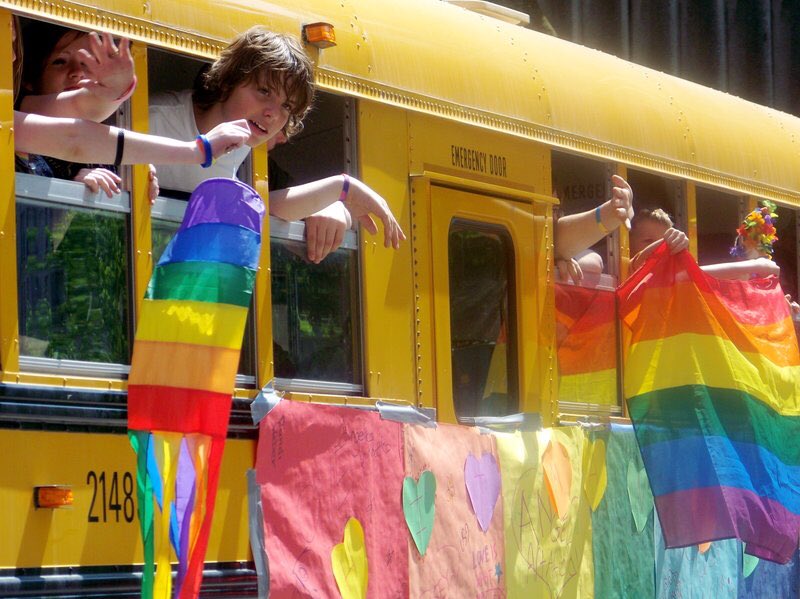By Ethan Rice, Senior Attorney
This past March, Florida’s Governor Ron DeSantis signed House Bill 1557, the law also known as “Don’t Say Gay or Trans”. This archaic and cruel legislation forbids educators from discussing sexual orientation or gender identity in primary grades and limits discussions on these topics in secondary education. This bill also allows schools to “out” students to their parents without the youth’s consent. While the bill’s language is vague, the intent is clear: school employees may be disciplined for not “outing” youth to their parents. For the thousands of LGBTQ+ youth, parents, and educators across the state, this law is extremely personal and has dangerous consequences. As a trans man who grew up in southwest Florida in the 90s, the foundation of this law—silence, shame and denial— are what I was taught.
In elementary school, I remember asking my mom and her friends what “gay” meant. My mom simply told me, “it means happy.” But I could tell in the tone, body language, and whispers that none of the adults were even slightly happy about such an innocent question. The angry silence made it clear that “gay” was a bad word. A few years later, I understood that I was queer (and even later, that I was trans) and already knew that I was not acceptable. I was unmentionable. I should not exist. For a child navigating my identity alone, that’s a heartbreaking message to hear.
Years later in high school, I experienced the first mention of anything LGBTQ-related in my public school curriculum. But it wasn’t an empowering history lesson about brave LGBTQ+ heroes such as Marsha P. Johnson and Bayard Rustin. Instead, my world history teacher taught the class that King Edward II was killed by having a poker shoved into his anus. Even worse: he was murdered for being a “homosexual,” and, according to my teacher, “he got what he deserved.” I couldn’t believe what I heard: Not only was this ahistorical, but being LGBTQ+ is a sin punishable by death. The adults who were supposed to protect me were criminalizing and stigmatizing me, making me unsafe.
Thankfully, when I got to Florida International University, I had the exciting and freeing opportunity to live out loud and learn about our history and read books where queer characters were the main protagonists. However, it was also embarrassing to have never heard of the Stonewall riots, let alone the names of those who fought for my rights there. But I realized that’s not my shame— that’s the shame of bigots who hid my history from me. If I learned anything, it’s that if these people are allowed, they will do anything to erase us.
These lessons played a part in shaping me and how I see the world. I’ve spent years undoing them. But in 2022, children and young adults should never be taught shame and silence. That’s why Florida’s “Don’t Say Gay or Trans” law and similar laws and bills across the country, including laws banning books and school districts seeking to conceal and obscure our country’s history of racism and sexism, are so dangerous. While blocking knowledge doesn’t block self-discovery, these laws cruelly render another innocent generation vulnerable to bullying, suicide, trauma, and disconnection.
It’s maddening because if public education is to raise healthy, productive members of society, then that education must include the language, history, and lived reality of all people, not just those who are cis, straight, white, and middle-class. And requiring teachers to “out” youth to their parents is just another despicable attempt to harm, terrify, and shame LGBTQ+ youth and potentially place them in the crosshairs of unsupportive, homophobic, and transphobic parents.
We learned from the early days of AIDS activism that “silence equals death,” and a similar sentiment relates to these laws and their impact. There is an imperative and tangible power for LGBTQ+ youth to be unapologetically visible, recognized, and respected by the law and our communities. There is no justification for the unequal treatment and the erasure of LGBTQ+ people that laws like HB1557 require. Our children should be allowed to just be children—which bigotry steals from them—all while simultaneously living, existing, and being affirmed in their truth from the classroom and beyond. But most importantly, they should be free to scream—not just “say”—and celebrate all the words that embody the beauty of who they are and face zero consequences.
Our youth are already doing everything they can to fight these unjust laws and live freely. It’s up to us, the adults, to be by their side to help foster a world where that’s possible.

